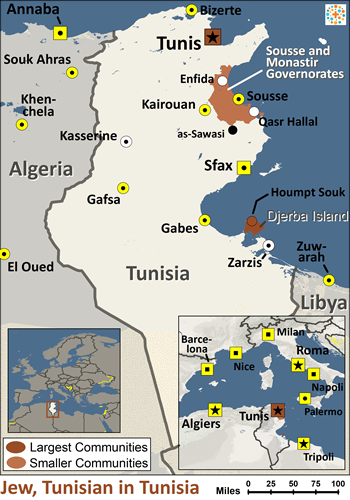The first reliable records of Jews living in Tunisia is from the 200s during the Roman Empire. Their population has risen and fallen through the centuries. After the Western Roman Empire began to crumble in the 400s, the Jews in Tunisia lived peacefully under the Vandals. That was not the case when Tunisia was under the Byzantine Empire. When Arab Muslims conquered North Africa in the 700s, the Jewish population had to pay a jizya tax, charged to all non-Muslims. Through the centuries there were Muslim leaders who protected them while others did not.
As European powers, namely Spain and France, began to make inroads into North Africa, the Jewish population was affected. In Tunisia, they favored the French, especially during the days of the French Revolution. The German Nazis controlled Tunisia for six months in 1942, at a time when there were 100,000 Jews there. As expected, the Nazis send Jews to forced labor camps where many died or were exterminated.
Things became harder for the Jews after Tunisia gained her independence from France in 1956. Commonly the Arab majority wanted Tunisia to be an Arab land. Anti-Semitic persecution led 40,000 to leave between 1956-67. By 1970 most Jews had left Tunisia. However, there is still a small Jewish community in Djerba, Tunisia. They want to stay in Tunisia, though there are terrorists who have attacked synagogues with the intention of driving them out.
The Jewish community in Tunisia is small, yet it is the second largest in the Arabic speaking world. Most of these Tunisian Jews are Orthodox, thus they live conservative lifestyles that challenge the patience of their women who are expected to work in the home. Women have limited access to education.
The men are usually good bread-winners who produce and sell jewelry. They work alongside their Muslim neighbors in the local markets selling their wares.
The Tunisian Jews are usually Orthodox, so they observe the Sabbath and try to adhere to the teachings of the Talmud and the prophets. One of the difficulties they face is when they have a Jewish festival or pilgrimage. Muslim militants are inclined to attack them, so they need tight security. Tunisian Jews have one pilgrimage that they can call their own. It involves a Jewish woman in Djerba who hundreds of years ago was rejected by the Jewish community and died alone in her home. Today she is revered as a saint, and Jews come together to revere her memory.
Throughout their history, the Jews have been discriminated against and persecuted, and Tunisia is no exception. They need to experience emotional healing and forgiveness. Pray that as the gospel is shared with them, it will not be viewed as anti-Semitic, but rather as the fulfillment of what God promised humanity through Abraham centuries ago.
Pray for God's protection of Tunisian Jews from terrorists and other murderers.
Pray for a spiritual hunger among Tunisian Jews who view their Jewishness as an ethnic identity and have no religious affiliation.
Pray for a movement to Christ among Tunisian Jews so they can enjoy fellowship with their Messiah.
Pray for the Lord to send loving ambassadors for the messiah to Tunisian Jewish people.
Scripture Prayers for the Jewish, Tunisian in Tunisia.
https://en.wikipedia.org/wiki/History_of_the_Jews_in_Tunisia
https://www.rferl.org/a/the-last-jews-of-tunisia/27809506.html
https://www.jewishvirtuallibrary.org/tunisia-virtual-jewish-history-tour
| Profile Source: Joshua Project |

























